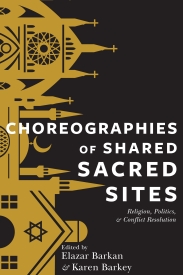Featured Publication
Choreographies of Shared Sacred Sites: Religion, Politics, and Conflict Resolution
Edited by Elazar Barkan and Karen Barkey

This anthology explores the dynamics of shared religious sites in Turkey, the Balkans, Palestine/Israel, Cyprus, and Algeria, indicating where local and national stakeholders maneuver between competition and cooperation, coexistence and conflict. Contributors probe the notion of coexistence and the logic that underlies centuries of “sharing,” exploring when and why sharing gets interrupted—or not—by conflict, and the policy consequences.
These essays map the choreographies of shared sacred spaces within the framework of state-society relations, juxtaposing a site’s political and religious features and exploring whether sharing or contestation is primarily religious or politically motivated. While religion and politics are intertwined phenomena, the contributors to this volume understand the category of “religion” and the “political” as devices meant to distinguish between the theological and confessional aspects of religion and the political goals of groups. Their comparative approach better represents the transition in some cases of sites into places of hatred and violence while in other instances they remain noncontroversial. The essays clearly delineate the religious and political factors that contribute to the context and causality of conflict at these sites and draw on history and anthropology to shed light on the often rapid switch from relative tolerance to distress to peace and calm.
 Karen Barkey is Professor of Sociology and History and the director of the Institute for Religion, Culture and Public Life. She studies state centralization / decentralization, state control and social movements against states in the context of empires. In her recent work she has also explored the issue of toleration and accommodation in pre-modern empires. Her research focuses primarily on the Ottoman Empire, and recently on comparisons between Ottoman, Habsburg and Roman empires. Her first book, Bandits and Bureaucrats: The Ottoman Route to State Centralization, studies the way in which the Ottoman state found new strategies of control and managed to incorporate potentially contentious forces into the Ottoman polity. Her recent book, Empire of Difference: The Ottomans in Comparative Perspective is a comparative study of different forms and moments of imperial organization and diversity.
Karen Barkey is Professor of Sociology and History and the director of the Institute for Religion, Culture and Public Life. She studies state centralization / decentralization, state control and social movements against states in the context of empires. In her recent work she has also explored the issue of toleration and accommodation in pre-modern empires. Her research focuses primarily on the Ottoman Empire, and recently on comparisons between Ottoman, Habsburg and Roman empires. Her first book, Bandits and Bureaucrats: The Ottoman Route to State Centralization, studies the way in which the Ottoman state found new strategies of control and managed to incorporate potentially contentious forces into the Ottoman polity. Her recent book, Empire of Difference: The Ottomans in Comparative Perspective is a comparative study of different forms and moments of imperial organization and diversity.

Elazar Barkan is Professor of International and Public Affairs at Columbia University, Director of SIPA’s Human Rights and Humanitarian Policy Concentration, and Director of Columbia’s Institute for the Study of Human Rights. Barkan is also founding Director of the Institute for Historical Justice and Reconciliation (IHJR) in The Hague. Professor Barkan served on ISHR’s board of directors before becoming ISHR’s co-director in 2007 and director in 2008. Previously, Professor Barkan served as chair of the History Department and the Cultural Studies Department at the Claremont Graduate University, where he was the founding director of the Humanities Center. Professor Barkan is a historian by training and received his PhD from Brandeis University.
More information on this and other publications in the Religion, Culture, and Public Life series is available at the Columbia University Press.
